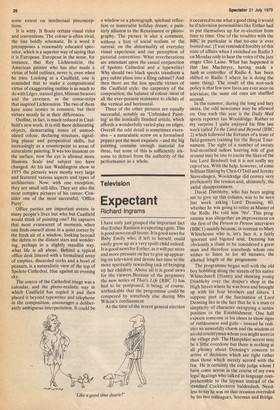Television
Expectant
Richard Ingrams
I have only just grasped the important fact that Esther Rantzen is expecting again. This is good news on all fronts. It is good news for Baby Emily who, if left to herself, could easily grow up as a very spoilt child indeed. It is good news for Esther, as it will put more and more pressure on her to give up appearing on television and devote her time to the more spiritually rewarding task of bringing up her children. Above all it is good news for the viewers.Because of the pregnancy the new series of That's Life (BBC 1) has had to be postponed, it being, of course, unthinkable that the programme could be compered by somebody else during Mrs Wilcox's confinement.
At the time of the recent general election it occurred to me what a good thing it would be if television personalities like Esther had to put themselves up for re-election from time to time. One of the troubles with the BBC in particular is that no-one is ever booted out. (1 was reminded forcibly of this state of affairs when I switched on Radio 3 on Monday only to hear the voice of the jazz singer Cleo LaMe. What has happened is that lan MacIntyre, having made a hash as controller of Radio 4, has been shifted to Radio 3 where he is doing the same thing). The result of this non-sack policy is that few new faces are ever seen on television; the same old ones are shuffled around.
In the summer, during the long and lazy siesta, the odd newcomer may be allowed on. One such this year is the Daily Mail sports reporter Ian Wooldridge. Rather to my surprise I quite enjoyed his film last week called To the Limit and Beyond (BBC 2) which followed the fortunes of a team of field-gunners training for the Royal Tournament. The sight of a number of sweaty foul-mouthed sailors heaving bits of gun around may be one to excite the likes of the late Lord Bradwell but it is not really my cup of tea. With the help, however, of some brilliant filming by Chris O'Dell and Jeremy Stavenhagen, Wooldridge did convey very proficiently the tension and, ultimately, the awful disappointment.
David Dimbleby, who has been urging me to give up this column, was to be seen last week asking Lord Denning, 80, whether he was going to retire as Master of the Rolls. He told him 'No'. This programme was altogether an improvement on the first of the Person to Person interviews (BBC1) mainly because, in contrast to Mary Whitehouse who is, let's face it, a fairly ignorant and bigoted soul, Denning has obviously a claim to be considered a great man and therefore somebody whom one wishes to listen to for 40 minutes, the allotted length of the programme.
The programme began well with the old boy hobbling along the streets of his native Whitechurch (Hants) and showing young Dimbleby over the draper's shop in the High Street where he was born and brought up with his four brothers and sisters. suppose part of the fascination of Lord Denning lies in the fact that he is a man 01 simplicity of character occupying a senior position in the Establishment. One hall expects someone in his shoes to show signs of ruthlessness and guile — instead he radiates an unworldly charm and the wisdom ol an old countryman whom you might meet in the village pub. The Hampshire accent may be a little overdone but there is nothing at all phoney about Denning's concern to arrive at decisions which are right rather than those which merely accord with the law. He is certainly the only judge whom I have come across in the course of my own legal dealings who talked in language comprehensible to the layman instead of the standard Cocklecarrot balderdash. Needless to say he was on that occasion overruled by his two colleagues, Scarman and Bridge.


































 Previous page
Previous page